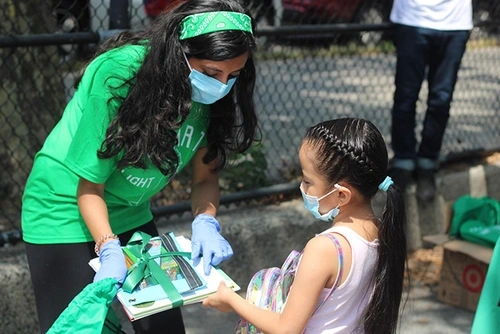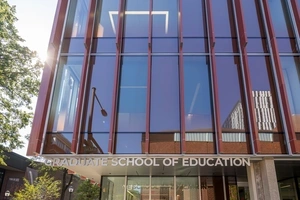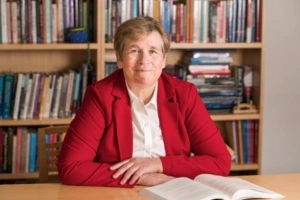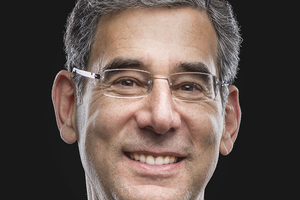From teaching in the classrooms of the south Bronx to running a breakaway nonprofit that shows no signs of slowing down, the past few years have been something of a whirlwind for Penn GSE graduate Rina Madhani.
Months after receiving her MSEd from Penn GSE’s Teaching, Learning, and Leadership Program in 2019, Madhani became Executive Director and Co-Founder of Start Lighthouse, a nonprofit dedicated to promoting and fostering childhood literacy.

Originating from a spark of an idea that came to her while teaching in an underserved community, the program has been a wild success — and Madhani credits Penn GSE with helping her turn that spark into an impactful reality.
Madhani began her career teaching 10th-grade English, soon transitioning into elementary education where she taught grades 1-3. It was there that she noticed a significant, “pervasive” literacy gap and concluded the biggest barrier to literacy in the community was access to books.
“Book ownership is really rare in a community like the Bronx, where the reality is there’s only one age-appropriate book available per 300 children as opposed to 13 books per child in the homes of their more affluent peers,” says Madhani.

If you were to trace the development of Start Lighthouse — which to date has distributed more than 7,500 culturally responsive books to more than 3,000 students in the south Bronx — back to its earliest roots, you’d find yourself in those New York City elementary school classrooms. It’s there Madhani says the idea started to percolate.
First, though, she wanted to build upon her classroom experience to explore the pedagogical theories that guide the education system. In searching for a master’s program that would meet her needs, she found Penn GSE’s Teaching, Learning, and Leadership Program.
“It drew me in because I knew I wanted to transition from the classroom, but I wanted to stay in the education sector,” explains Madhani. “I saw how multidisciplinary this program was in terms of the pathways we could take and courses we could engage in, as well as the incredible access to distinguished faculty members. I wanted to learn as much as I could to make that transition in my life, and Penn GSE made that possible.”
Madhani speaks highly of her entire experience at Penn GSE, drawing specific attention to an education entrepreneurship class with Amanda Antico that prompted her to think about the practical aspect of addressing problems in the education system — creating real solutions that could be implemented alongside students, families, and administrators.
Start Lighthouse, then still only a concept, continued to brew. At Penn GSE, Madhani found driven, likeminded professionals who believed, as she did, in the power of an individual to implement systemic change. Within the Teaching, Learning and Leadership Program, Madhani found Veronica Aplenc to be a continual source of inspiration, knowledge, and support.
“Veronica just wholeheartedly believed we could set our minds to anything and actually achieve it,” says Madhani. “Having someone like that in my life was so influential. It created an environment where I felt like I could take these ideas that were in my head and bring them to life.”
Months after receiving her MSEd, in March 2020 — just one week after COVID-19 was declared a pandemic by the World Health Organization — widespread school and library closures throughout the Bronx community inspired her to apply those teachings and finally make Start Lighthouse a reality.
“I realized that the needs were bigger than me, and that I needed to be able to just step up and support the community and students I had been serving and working alongside,” she says.
Initially, the idea was to answer calls from students and families around the community for additional support, resources, and learning materials. It started as a simple book drive. Two years later, it has evolved into a full-fledged nonprofit working tirelessly to combat childhood illiteracy in underserved neighborhoods.
Start Lighthouse does this by utilizing an intergenerational approach, designed specifically to empower students, their family members, and their caregivers through three initiatives:
- The Literary Adventures Program: In partnership with Title One public schools and the local community, Start Lighthouse creates an immersive experience where students engage with nationally recognized, award-winning BIPOC authors and illustrators in interactive workshops. Students exercise agency and create their own libraries full of books that belong to them and are reflective of their lived experiences and identities — a meaningful distinction with long-lasting impact.
- Creating inclusive learning spaces: By working with partner schools and local teachers, the group uses literacy as an entry point to cultivate inclusive learning spaces. These spaces are designed to foster conversations around identity, racism, and social justice in a developmentally appropriate and relevant way.
- Empowered Readers Program: Students in the program are taught the arts of library curation and auditing, then given the agency and resources to apply their learning and create a diverse library for their classroom — or even their entire school.
According to Madhani, Start Lighthouse currently works with eight Title One schools across the Bronx. Ultimately, they hope to create “literacy hubs” at school sites where their programming can live year-round and provide students with a safe place they can go at any time, inviting their family members, caregivers, or fellow students to join them and engage with literacy.
“And that,” she adds, “is essentially how we plan to revitalize literacy across the entire borough.”
In January, Start Lighthouse welcomed another partner to their cause: Macmillan Publishers, who announced they were donating $84,000 to the program. Madhani notes the donation is the start of what will be a two-year partnership to help expand programming and bring more books to more students.
The books provided by Start Lighthouse are not randomly selected: Madhani works to provide these diverse communities of students with books that offer greater representation. It has reinforced for her just how important it is for children to see themselves reflected in the books they have access to. She talks about having students walk up to her and point out the little girl in their book who is wearing a hijab just like theirs — or one student who asserted that she does, in fact, like her natural hair and its natural texture.
“And those are the moments that really affirm the importance of the work we’re doing,” says Madhani. “We’re not just distributing books; we’re distributing them in an intentional way so students can see themselves and that they’re recognized and heard and respected. It’s fighting back against the erasure that happens in mainstream media.”
Asked if there were anything she wished more people understood about combating childhood literacy, Madhani stresses the importance of book ownership — of a child feeling like a book truly belongs to them and represents who they are. After all, she notes, it only takes one book to ultimately help a student become a lifelong reader. Finding that spark and creating that entry point is the whole ballgame.
And as she reflects on where this journey started — and what might be next for the nonprofit that only three years ago was nothing but an idea — she mentions once more the importance of Penn GSE in helping her get to this point.
“I wouldn’t be where I am today without having been a part of the Penn GSE community,” says Madhani. “The faculty and friends I met there have been some of my biggest supporters throughout this journey. Entrepreneurship can get lonely. It can be isolating. There are more bad days than good. Sometimes it’s having those people I met during grad school, who continue to support me, that lifts me up on those days.”
Photos courtesy of Start Lighthouse.








